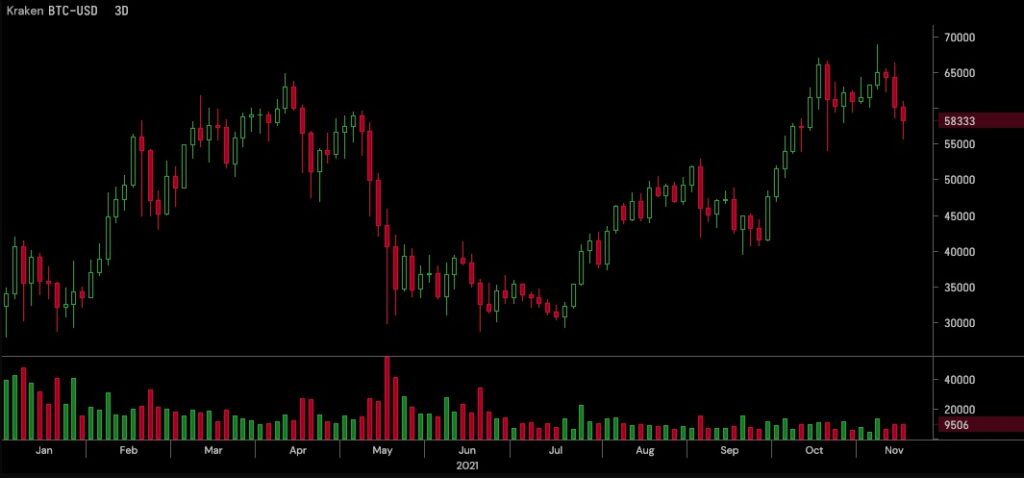Why Is Crypto Crashing? Here’s Why Crypto Markets Are Down

Here come the crypto bears. “Why is crypto crashing,” they ask though their smirks. But it makes sense that long-term holders would be asking the same question. After all, Bitcoin is just a week off its all-time high.
So whatever could be pushing the crypto market down? It’s been hit with a trifecta of not-so-great news. Most should only have short-term impact. But some could leave a lasting impression on the markets for a while.
Here’s why crypto went down…

Why Is Crypto Crashing Reason No. 1: Sell-Offs
Those all-time highs rarely stay all-time high for long on the crypto world. Big values equal a reason to exit a position. That’s just from short-term investors looking to capitalize off any gains they can realize.
But that’s nothing new. Here’s a chart of the price action of Bitcoin this year so far from the Cryptowatch application.

Notice anything? Soaring values are often met with quick declines. It’s the natural ebb and flow of crypto prices. And with an asset as volatile as crypto, it does make sense. Buying the dip and selling the high is an easy way to lock in some gains.
However, that’s not the only thing that pushed the crypto markets down… That most likely wouldn’t have been enough to send Bitcoin falling by more than 17%. But it’s part of the answer to the question, “Why is crypto crashing?”
Another reason crypto markets went down was due to news that the tax man is about to cometh.
Reason No. 2: The Infrastructure Bill
Crypto has remained largely unregulated. With some minor exceptions that is. But that’s about to change. And that’s another piece to the puzzle of “Why is crypto crashing.”
To be fair, the Financial Crimes and Enforcement Network doesn’t consider crypto to be legal tender. The Securities and Exchange Commission considers crypto to be a security. And the IRS, well it considers crypto to be property. But that’s been the extent of things for the most part.
However, regulators are about to start doing a little more regulating…
With President Biden’s signature now dry on the $1.2 trillion infrastructure bill, we can start looking at how it will impact crypto investors. And for starters, the new law requires crypto exchanges to issue a 1099-B form. That means exchanges will now have to notify the IRS directly of any crypto transactions. This will make it a lot more difficult (if not impossible) for crypto investors to hide their gains. And it’s evident that some looking to avoid those taxable gains sold off before the bill was signed into law.
This one shouldn’t be a big shock to crypto investors either. The writing has been on the wall for some time now. However, this paired with recent all-time highs only exacerbated the sell off.
But the effects of these two developments are already starting to fade. At last check, Bitcoin, Ethereum and Solana were already showing signs of bouncing back. However, there is another elephant in the room. And the effects of it could linger for some time.
Reason No. 3: The Mt. Gox Effect
If you’re relatively new to crypto, you may not have heard of Mt. Gox. But in its day, it was far and away the biggest crypto exchange in the world. At its peak, more than 70% of all Bitcoin transactions went through Mt. Gox.
Then one day in February of 2014, Mt. Gox suspended trading. It then closed down its website and all exchange services. This was followed by filing of bankruptcy protection from creditors. Within a couple of months, it began liquidation proceedings.
After all of this, the exchange announced that around 850,000 Bitcoins belonging to costumers were missing. While some were found, the lion’s share were not. An investigation by WizSec found that most of the missing Bitcoin was stolen right out of the Mt. Gox hot crypto wallet over a period of a couple years. So, word to the wise, pick a safe crypto wallet to store your spoils in.
OK, history lesson done. Now you ask, what does this have to do with the question, “Why is crypto crashing?” Well, Mt. Gox is in the midst of rehabilitating itself. And part of that plan is to return more than 141,000 Bitcoins to their rightful owners.
The defunct exchange will be returning roughly $8.5 billion of Bitcoin to traders after receiving final approval from its trustees. Now it’s just a matter of time until confirmation is issued from a Japanese court (where Mt. Gox was based).
Considering most of the Bitcoin were acquired for $1,000 or less, once the coins are returned, a pretty massive crypto sell-off is expected once they are officially returned. Of the three reasons behind the question, “Why is crypto crashing,” this one is likely to have the most serious long-term effect on prices.
Why Is Crypto Crashing: The Bottom Line
All-time highs and a new level of regulation would normally be shrugged off after a couple of weeks. But this Mt. Gox situation could have serious implications for investors. We’re not trying to sow any FUD in readers about crypto though. Short-term (think a few months), the crypto markets could get rocky. And realistically this should primarily affect Bitcoin. But as we’ve seen before, Bitcoin can be the rising tide that lifts all boats. And it can just as easily send them to the sea floor. How this will all shake out is a bit of a mystery. But it’s unlikely that we’ve seen Bitcoin’s low just yet.
Wondering which coins should remain isolated from Bitcoin’s price fluctuations? We suggest signing up for Manward Financial Digest e-letter. In it, crypto expert Andy Snyder offers up sage advice for crypto investors looking to weather volatility storms. And all you have to do is enter your email address in the box below to learn more. We’re likely to be asked again soon, “Why is crypto crashing.” But sometimes a dip is just a lucrative buying opportunity.







